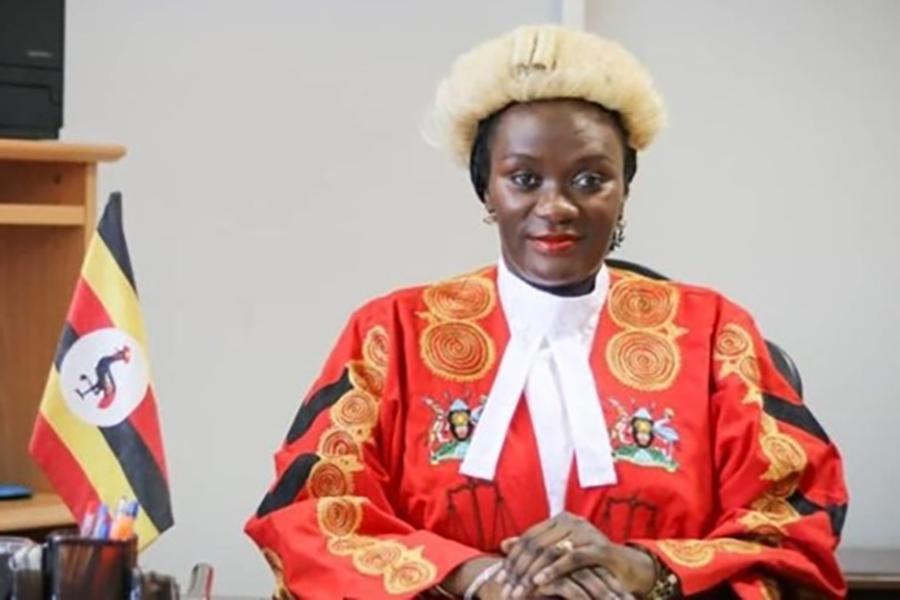By Brenda Zabeti Nabasirye
Africa-Press – Uganda. For over two decades, Justice Lydia Mugambe has stood as a beacon of integrity in Uganda’s judiciary and a formidable advocate for human rights on the global stage.
She is perhaps best remembered for her courageous 2017 ruling against Mulago Hospital over the disappearance of a newborn baby — a groundbreaking decision that held a major state institution accountable for negligence. That ruling became a touchstone for justice for the marginalized and positioned Uganda at the forefront of progressive legal thought on maternal health and the rights of women and children.
Now, however, this towering figure in the legal world finds herself the subject of a very different kind of headline. Accusations from a former domestic worker have turned the spotlight on her in ways that seem almost surreal to those familiar with her life’s work. The case — involves allegations including forced labor, trafficking, and conspiracy to breach UK immigration.
She was convicted in March 2025 by Oxford Crown Court and now awaits sentencing on 2 May. This case exploded across media platforms. But beneath the noise, a critical question emerges: have we truly heard the full story?
There is no denying the seriousness of the allegations, but what has been largely missing from public discourse is the context of Judge Mugambe’s life and legacy — one steeped in service, integrity, and courage. She was a recipient of the U.S. Embassy’s Women of Courage Award in Uganda, a distinction reserved for leaders who advance justice and equity against great odds. ]
Her career includes service at the United Nations and as a Legal Officer at the International Criminal Tribunal for Rwanda (ICTR), where she helped prosecute those responsible for the 1994 genocide — one of history’s darkest chapters.
As a High Court Judge and former magistrate, Mugambe has approached her role with impartiality and compassion, presiding over numerous cases with a keen eye on justice and human dignity. Her voice has been a key presence in global conversations on gender-based violence, judicial integrity, and human rights, earning her esteem among international legal bodies, feminist groups, and scholars alike.
She is more than just a judge — she is a legal scholar, a mentor to young lawyers, and a widely respected speaker at policy summits and academic institutions across continents. Her nuanced understanding of law and justice has informed conversations in Africa, Europe, and the United States.
Despite all this, the current allegations and eventual conviction have cast a long shadow. They stem from a domestic worker who lived with Mugambe’s family for years — someone who was reportedly treated not just as an employee, but with kindness and inclusion. Media reports have largely omitted the history of financial, emotional, and educational support that Mugambe is said to have extended to the worker and her family. A long-standing relationship of trust has now been reinterpreted, publicly and prematurely, as one of exploitation.
So we must ask: why would a woman who risked her career to expose institutional failure, who helped bring justice to victims of genocide, and who has been a relentless voice for human rights, suddenly abandon her core values? Is it not worth considering whether this might be a case of betrayal or misrepresentation? Could a generous gesture have spiraled into a legal quagmire, worsened by a media narrative that prefers simplicity over nuance?
There are murmurs suggesting this case may be more layered than it appears — that the prosecution and civil society organizations may have become uncomfortably aligned with the accuser, and that key facts have been distorted or overlooked entirely. Yet in the mainstream media, Justice Mugambe’s voice is conspicuously missing, and her decades of service and good character have been ignored.
Let us be clear: this is not a plea for blind exoneration. The allegations may be serious but caution is raised when reflecting on the public’s response, which has too often leaned toward condemnation without a full picture. Justice Mugambe, like any citizen, deserves the presumption of innocence — a cornerstone of any fair legal system. That principle should not be cast aside because she is prominent, nor should it be ignored in the pursuit of headlines.
We must demand better — from our media, from our institutions, and ourselves. The press must tell the whole story, not just the most provocative angle, the victim’s angle. The public must resist the urge to form instant opinions, and the legal community must remain vigilant in protecting not just the laws of the land, but the spirit in which they were created — one that champions fairness, truth, and humanity.
This moment calls not for silence or for shielding the powerful, but for a more honest reckoning with complexity. We must be willing to sit with uncomfortable contradictions and resist reducing individuals to the sum of their most salacious allegations. Justice demands no less.
In Judge Lydia Mugambe’s case, the stakes are more than personal. They speak to the kind of society we want to be — one that upholds justice in word and practice, even when the subject is a figure once held in high esteem. In our pursuit of accountability, let us not forget compassion. In our demand for justice, let us not abandon truth.
Because if we are to call ourselves a just society, then we must be one — not just when it is easy, but especially when it is hard.
Brenda Zabeti Nabasirye, International lawyer and women’s rights advocate.
Source: Nilepost News
For More News And Analysis About Uganda Follow Africa-Press






